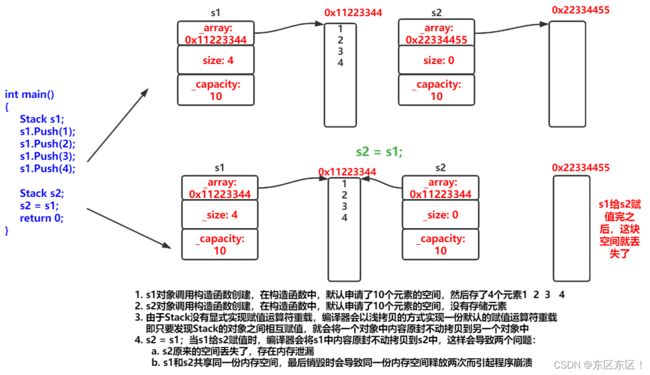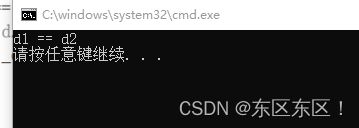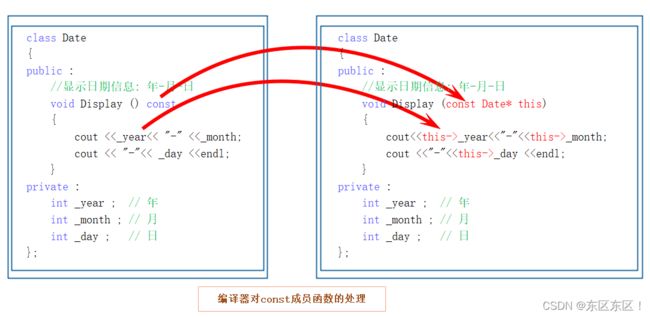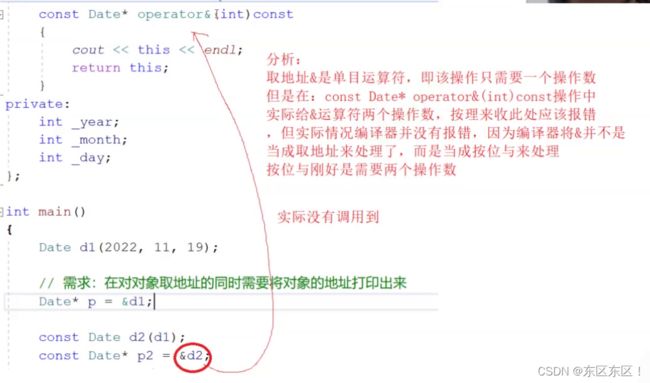C++类与对象(三)赋值运算符重载、const成员
目录
1.赋值运算符重载
1.1引入
1.2 运算符重载
1.3赋值运算符重载
1.4 前置++和后置++重载
2.const成员
3.取地址及const取地址操作符重载
1.赋值运算符重载
1.1引入
赋值运算符重载:用已存在的对象,给另一个已存在的对象赋值
还是使用上节日期类的代码,在测试中如下操作:
class Date
{
public:
Date(int year = 2000, int month = 1, int day = 1)
{
_year = year;
_month = month;
_day = day;
cout << "Date(int,int,int):" << this << endl;
}
Date(const Date& d)
{
_year = d._year;
_month = d._month;
_day = d._day;
cout << "Date(const Date& d):" << this << endl;
}
~Date()
{
cout << "~Date():" << this << endl;
}
private:
int _year;
int _month;
int _day;
};
void TestDate()
{
Date d1(2022,11,15);//构造函数
Date d2(d1); //拷贝构造函数
Date d3;//用的默认的参数,创建的时候没给实参
d3 = d2; //用已存在的对象,给另一个已存在的对象赋值,
Date d4 = d3;//拷贝构造
}语法:如果程序员没有显示定义赋值运算符重载,则编译器会自动生成一份
实际情况:编译器不一定会生成,但是编译器一定会完成赋值的操作
如果类中未涉及到资源管理,赋值运算符是否实现都可以;但是, 一旦涉及到资源管理则必须要实现 ,比如栈的代码,当进行以下操作时:
这时候会出现浅拷贝,导致内存泄漏问题,那么为了解决这个问题,就需要使用 赋值运算符重载方法,下面依次进行学习
1.2 运算符重载
还是从代码来学习:
需求:检测两个日期类型对象是否相等(用的还是上面日期类代码,修改部分如下)
//需求:检测两个日期类型对象是否相等
bool IsEqual(const Date& d)
{
return _year == d._year &&
_month == d._month &&
_day == d._day;
}
int main()
{
Date d1(2022, 11, 15);
Date d2(d1);
if (d1.IsEqual(d2))
{
cout << "d1 == d2" << endl;
}
else
{
cout << "d1 != d2" << endl;
}
//上面不直观,要是使用==如下
if (d1==d2)
{
cout << "d1 == d2" << endl;
}
else
{
cout << "d1 != d2" << endl;
}
return 0;
}
使用==会报错,所以注意,自定义类型不支持 == 的运算符,因为编辑器不知道怎么比较
如果一定要使用 == 来比较自定义类型对象, 必须告诉编译器比较的规则--->运算符重载
修改上述代码
bool operator==(const Date& d)
{
return _year == d._year &&
_month == d._month &&
_day == d._day;
}
if (d1==d2)//与if(d1.operator(d2))等价
{
cout << "d1 == d2" << endl;
}
else
{
cout << "d1 != d2" << endl;
} C++为了增强代码的可读性引入了运算符重载,运算符重载是具有特殊函数名的函数, 也具有其返回值类型,函数名字以及参数列表,其返回值类型与参数列表与普通的函数类似。
函数名字为:关键字 operator 后面接需要重载的运算符符号 。
函数原型: 返回值类型 operator 操作符 ( 参数列表 )
注意:
1.在operator后面跟的必须是C++支持的运算符,不能通过连接其他符号来创建新的操作符:比如operator@,
2.重载操作符必须有一个类类型参数
3.用于内置类型的运算符,其含义不能改变,例如:内置的整型+,不 能改变其含义
4.作为类成员函数重载时,其形参看起来比操作数数目少1,因为成员函数的第一个参数为隐藏的this
5. .* :: sizeof ? : . 注意以上5个运算符不能重载。这个经常在笔试选择题中出现。
1.3赋值运算符重载
1. 赋值运算符重载格式
参数类型:const T&,传递引用可以提高传参效率
返回值类型:T&,返回引用可以提高返回的效率,有返回值目的是为了支持连续赋值
检测是否自己给自己赋值
返回*this :要复合连续赋值的含义
Date& operator=(const Date& d)
{
if(this != &d)
{
_year = d._year;
_month = d._month;
_day = d._day;
}
return *this;
} 2. 赋值运算符只能重载成类的成员函数不能重载成全局函数
原因:赋值运算符如果不显式实现,编译器会生成一个默认的。此时用户再在类外自己实现一个全局的 赋值运算符重载,就和编译器在类中生成的默认赋值运算符重载冲突了,故赋值运算符重载只能是类的成员函数
3. 用户没有显式实现时,编译器会生成一个默认赋值运算符重载,以值的方式逐字节拷贝。注意:内置类 型成员变量是直接赋值的,而自定义类型成员变量需要调用对应类的赋值运算符重载完成赋值
1.4 前置++和后置++重载
// 前置 ++ :返回 +1 之后的结果
// 注意: this 指向的对象函数结束后不会销毁,故以引用方式返回提高效率
Date& operator++()
{
_day += 1;
return *this;
}// 后置++:
// 前置 ++ 和后置 ++ 都是一元运算符,为了让前置 ++ 与后置 ++ 形成能正确重载
// C++ 规定:后置 ++ 重载时 多增加一个int类型的参数 , 但调用函数时该参数不用传递,编译器自动传 递
// 注意:后置 ++ 是先使用后 +1 ,因此需要返回 +1 之前的旧值,故需在实现时需要先将 this 保存一份,然后给this+1
// 而 temp 是临时对象,因此只能以值的方式返回,不能返回引用
Date operator++(int)
{
Date temp(*this);
_day += 1;
return temp;
}int main()
{
Date d;
Date d1(2022, 1, 13);
d = d1++; // d: 2022,1,13 d1:2022,1,14
d = ++d1; // d: 2022,1,15 d1:2022,1,15
return 0;
}2.const成员
将const修饰的“成员函数”称之为const成员函数,const修饰类成员函数,实际修饰该成员函数隐含的this指针,表明在该成员函数中 不能对类的任何成员进行修改
A.普通成员函数:没有被const修饰的成员函数
在该成员函数中,可以对对象成员变量进行修改
this类型:Date* const ----》this的指向不能修改,this指向空间的内容可以修改
可写入:可以修改成员变量
void show()
{
_day += 1;
this->_day += 1; //与上面等价
cout << _year << "/" << _month << "/" << _day << endl;
}B const成员函数:被const修饰的成员函数
特性:不能修改“成员变量”
const修饰成员函数实际实在修饰this指针
this的类型:const Date* const
只读:只能读取this中成员,不能修改
注意:如果成员函数内部不一定会修改成员变量,最后将该成员设置const函数
class Date
{
public:
Date(int year = 2000, int month = 1, int day = 1)
{
_year = year;
_month = month;
_day = day;
}
void show()
{
_day += 1;
this->_day += 1; //与上面等价
cout << _year << "/" << _month << "/" << _day << endl;
}
//const成员函数:被const修饰的成员函数
//特性:不能修改“成员变量”
//const修饰成员函数实际实在修饰this指针
//this的类型:const Date* const
void Print()const
{
cout << _year << "/" << _month << "/" << _day << endl;
}
private:
int _year;
int _month;
int _day;
};
int main()
{
//普通对象d1可读可写,既可以调用普通成员函数也可以调用const成员函数
Date d1(20022, 12, 2);
d1.show();
d1.Print();
//const对象d2只读,只能调用const成员函数,只读不能写
const Date d2(d1);
d2.Print();
return 0;
} 请思考下面的几个问题:
1. const对象可以调用非const成员函数吗?
const对象不能修改调用普通成员函数
2. 非const对象可以调用const成员函数吗?
可以
3. const成员函数内可以调用其它的非const成员函数吗?
不可以
4. 非const成员函数内可以调用其它的const成员函数吗?
可以
3.取地址及const取地址操作符重载
class Date
{
public :
Date* operator&()
{
return this ;
}
//this的类型就是const Date* const
const Date* operator&()const
{
return this ;
}
private :
int _year ; // 年
int _month ; // 月
int _day ; // 日
};
int main()
{
Date d1(20022, 12, 2);
//需求:在对对象取地址的时候需要将地址打印出来
Date* p = &d1;
return 0;
} 这两个运算符一般不需要重载,使用编译器生成的默认取地址的重载即可,只有特殊情况,才需要重载,比如想让别人获取到指定的内容




